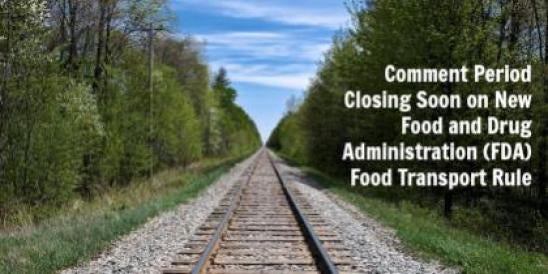Regulations proposed earlier this year by the U.S. Food and Drug Administration (“FDA”) would create new requirements applicable to shippers, carriers and receivers of human and animal food transported by rail and/or motor vehicle. Key requirements of the proposed regulations include:
-
an obligation on shippers to provide written instructions to the carrier regarding conditions necessary for the safe transport of the particular food items being shipped;
-
obligations on shippers and receivers to load/unload food in a manner that is sanitary and prevents spoilage; and,
-
obligations on carriers to provide appropriate vehicles and transportation equipment, maintain and store vehicles in a sanitary manner, and provide training to personnel related to potential food safety issues.
Transporting food under non-compliant conditions would constitute a crime and the transported food would be deemed “adulterated” and banned from interstate commerce under the federal Food, Drug and Cosmetic (“FD&C”) Act.
Members of the regulated community should evaluate participating in the rulemaking process to protect their interests. The deadline for submitting written comments on the proposed Rule on Sanitary Transportation of Human and Animal Food (Docket No. FDA-2013-N-0013) is July 30, 2014.
Scope of the Proposed Rule
The proposed FDA rule would apply broadly to shippers, carriers, and receivers of food by motor vehicle or rail, with several important exceptions discussed below. Under the proposed rule:
-
A “shipper” is any person or entity that initiates a shipment of food;
-
A “carrier” is any person who owns, leases, or is responsible for the use of a motor or rail vehicle to transport food; and,
-
A “receiver” is any person who receives a shipment of food, whether or not that person is the ultimate recipient of the shipment.
The proposed rule would not apply to:
-
“Non-covered businesses,” (i.e., businesses with less than $500,000 in annual sales);
-
The transportation of packaged, shelf-stable foods;
-
The transportation of compressed gasses to be used in food, such as carbon dioxide used to carbonate beverages;
-
Food that is transshipped through the U.S. to another country, or to food that is imported for future export and is neither consumed nor distributed in the U.S.;
-
The transportation certain raw agricultural commodities transported by farms or transportation of “live food animals”; and,
-
Shippers, carriers, or receivers that obtain waiver from the FDA. The proposed rule provides procedures by which an entity may seek a waiver from the FDA where a waiver would be in the public interest and not result in the transportation of food under conditions that would be unsafe for human or animal health.
The FDA tentatively concluded that the rule should apply to shipment of food across state boundaries as well as intrastate shipments (i.e.,shipments of food within a state’s borders), however, the agency requested public feedback on this point.
Obligations of Shippers, Carriers, and Receivers Under the Proposed Rule
If adopted, the rule would impose several distinct requirements on shippers, carriers, and receivers. Among these requirements, are:
Shippers would be required under the proposed rule to:
-
Specify to the carrier, in writing, all sanitary requirements for the carrier’s vehicle and transportation equipment, including any design requirements and cleaning procedures;
-
Visually inspect the vehicle or equipment for cleanliness before loading food not completely enclosed by a container onto a vehicle or transportation equipment provided by a carrier;
-
For food that can support the rapid growth of undesirable microorganisms in the absence of temperature control during transportation, specify in writing to the carrier the temperature conditions necessary during the transportation operation and verify prior to loading such food that each freezer and mechanically refrigerated cold storage compartment has been pre-cooled to the specified temperature; and,
-
Retain records demonstrating that the required information was provided to carriers.
Shippers and Receivers would be required under the proposed rule to:
-
Load and unload food that can support the rapid growth of undesirable microorganisms in the absence of temperature control in a manner that will prevent food from supporting such microbial growth; and,
-
Provide hand washing stations to personnel loading and unloading food that is not completely enclosed by a container (e.g., fresh produce in vented boxes or bags).
Carriers would be required under the proposed rule to:
-
Provide vehicles and equipment that are appropriate to prevent food from spoiling and meet the requirements specified by the shipper, including pre-cooling;
-
Develop and implement practices to maintain and store vehicles in a sanitary manner;
-
Demonstrate to the shipper (and upon request to the receiver) that any specified temperature conditions have been maintained during transport;
-
If offering a bulk vehicle for food transportation, provide information to the shipper regarding the three previous cargoes transported in the vehicle and a description of the most recent cleaning of the bulk vehicle. In the alternative, the shipper and carrier could make contractual arrangements addressing these points;
-
Provide training to personnel of potential food safety problems; and,
-
Maintain records of certain compliance activities.
The proposed rule would impose more stringent requirements on the transport of foods that require temperature control or speedy delivery to prevent spoiling. All shippers, carriers and receivers would be required to take effective measures to prevent cross-contamination of food transported in bulk vehicles, and to segregate or isolate food from raw foods and non-food items in the same load.
Penalties for Noncompliance
Transporting food under non-compliant conditions would constitute a crime under the FD&C Act, punishable by one year in prison and/or a $1,000 fine for each violation. Once food is transported under non-compliant conditions, it would be deemed “adulterated” and banned from interstate commerce. Generally, the “introduction or delivery for introduction into interstate commerce” of adulterated food also constitutes a crime.
Time for Compliance
If the proposed rule were adopted, businesses other than small businesses would have one year to bring their operations into compliance, while small businesses (e.g., shippers or receivers that employ fewer than 500 persons) would have two years.



 i
i

